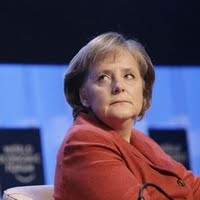The noncommittal closing statement of this weekend’s G-8 Summit cannot hide the fact that German Chancellor Angela Merkel found herself completely isolated at Camp David.
U.S. President Barack Obama closed ranks with newly elected French President Francois Hollande in stressing “an imperative to create growth and jobs” in opposition to Merkel’s rigid austerity programs. In Europe, after losing her two main allies earlier this month, Merkel stands alone, increasingly blamed for turning Greece’s June elections into a make-or-break moment for the future of the euro. Last weekend, she also suffered a grievous political setback when her Christian Democratic Union (CDU) was routed by voters in state elections in North-Rhine Westphalia, forcing her to fire her designated heir, Environment Minister Norbert Röttgen. Given her increasing isolation and this series of rebuffs, will Merkel change course before the portentous Greek election, or will she risk going for broke by tying her own fate and that of Germany’s role in Europe to the Greek ballot?
On Sunday, sports became more than just a metaphor for politics when world leaders at the G-8 Summit watched Chelsea defeat Bayern München in the Champions League Final. While Obama hugged the “winner,” British Prime Minister David Cameron, Merkel stood aside sour-faced. For the German chancellor, her team’s loss was symbolic of the whole summit and the past month.

